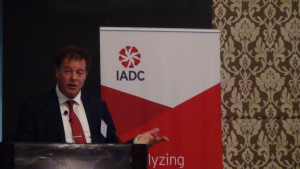ADCO: Safer rigs paramount to drilling growth in Middle East
By Alex Endress, Editorial Coordinator

Although drilling contractors in the Middle East have made significant strides in safety, future rig expansion will depend on the ability of industry leaders to cultivate even safer work environments, according to Chris Kuyken, Senior Vice President of Abu Dhabi Company for Onshore Oil Operations (ADCO). Mr Kuyken was a keynote speaker at the 2014 IADC Critical Issues Middle East Conference in Dubai in December.
Based on IADC’s Q3 2014 Incident Statistics Program (ISP) summary, the Middle East has recorded fewer incidents than the industry’s average, with a lost-time injury frequency (LTIF) of 0.58 and a total recordable case frequency of 1.53. This compares with a 1.13 industry average LTIF and a 2.45 average TRCF. While those numbers are encouraging, Mr Kuyken said there is room for improvement, as industry had yielded a total of 11 fatal injuries, 478 lost-time injuries and 570 restricted work cases, according to the ISP report.
“Let us not declare victory too soon because if you look at the total statistics, we are still actually hurting an unacceptable amount of people,” Mr Kuyken said. “Each offense is a tragedy in its own right, and those who have been involved in LTIF fatality investigations know that the magnitude of people affected by one incident is a lot higher than just the victim.”
On top of these safety concerns, Mr Kuyken said, drilling contractors are under pressure to do more work with less, develop broader skill sets among employees, and fast track development of young engineers and supervisors. “Solving today’s issues actually will set us up for the future,” Mr Kuyken said.
In-depth educational support for beginning engineers and supervisors will help streamline safer drilling processes, he said. But widespread deployment of these drilling processes will require better educational infrastructure to develop competency among the workforce. Referring to ADCO, he said the company offers employees 12 learning academies – for things such as well control and stuck-pipe prevention and also specifically for newcomers. Besides promoting safety, these academies encourage young engineers and supervisors to pursue professional accreditation, Mr Kuyken explained. “What we see is that most people want to do this. They see being accredited as a career enhancer.”
Mr Kuyken also suggested companies make good use of IADC resources, including the association’s accreditation programs, educational committees, and the Knowledge, Skill and Ability (KSA) database, which contains competencies for more than 70 rig-based positions. “IADC is providing true industry leadership,” he said.
He noted that in 2014, ADCO had a LTIF of 0.2 and TRCF of 0.79, lower than both the industry average and Middle East average. Mr Kuyken said ADCO had also increased from 35 to 70 rigs in three years’ time. He credited the growth to his competent staff. “I’m proud to be working in a company that is paying a lot of attention to the people development.”
To review IADC’s Incidents Statistics Program (ISP), click here.




